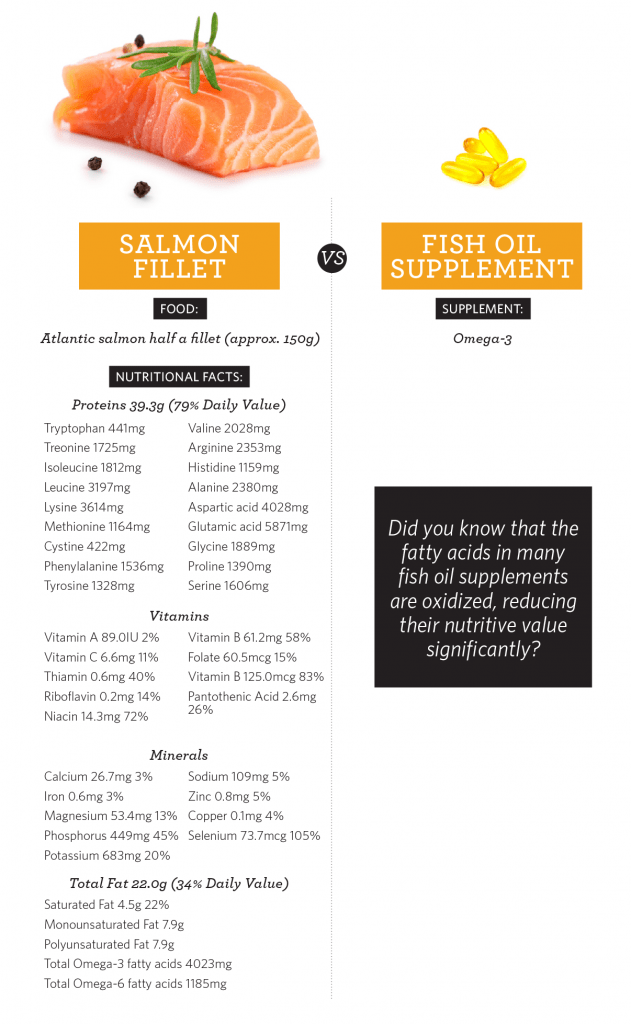 We know that eating fish regularly is a great way to get protein as well as healthy omega-3 fatty acids, a type of polyunsaturated fat often known as ‘the good fat.’ But should an athlete also add a fish oil-based omega-3 supplement to their daily intake?
We know that eating fish regularly is a great way to get protein as well as healthy omega-3 fatty acids, a type of polyunsaturated fat often known as ‘the good fat.’ But should an athlete also add a fish oil-based omega-3 supplement to their daily intake?
Many athletes wonder if they are getting the right nutrients in the right amounts to support the intense training and stress put on their bodies. While some athletes may need to supplement their dietary intake because of a diagnosed deficiency or medical condition, many athletes can properly fuel their bodies and meet all their bodies’ needs with the right food.
Before you grab the first bottle of fish oil off the shelf at the store, read on to make sure you fully understand fish oil supplements. And as always, remember that any supplement should be third-party tested to reduce the risk of a positive anti-doping test and/or negative health effects.
What are the health benefits of fish oil?
Omega-3 fatty acids include alpha-linolenic acid (ALA), eicosapentaenoic acid (EPA), and docosahexaenoic acid (DHA). DHA and EPA are both found in fish oil. And all three are considered essential, so it is important to have some source of each in a healthy diet. Findings show omega-3 fatty acids may help to:
- Lower blood pressure
- Reduce triglycerides
- Slow the development of plaque in the arteries
- Reduce the chance of abnormal heart rhythm
- Reduce the likelihood of heart attack and stroke
- Lower inflammation
- Lessen the chance of sudden cardiac death in people with heart disease
- Potentially reduce muscle soreness after exercise
However, it’s important to note that these findings relate to omega-3 fatty acids on the whole, not specifically to fish oil supplements. A 2018 study found that fish oil supplements didn’t improve memory in children, as previously thought, while a 2016 study debunked the idea that fish oil supplements could boost muscle growth.
How much fish oil do athletes need to stay healthy?
There are no governmentally recommended dosages for fish oil or omega-3 fatty acids, unfortunately. In fact, a review of the research on athletes and omega-3s notes that there isn’t sufficient evidence to suggest that there are any clear recommendations for the amount of DHA or EPA an athlete ingests.
That being said, the American Heart Association (AHA) recommends that everyone eats fish (particularly fatty, coldwater fish) at least twice a week. It’s also worth noting that, according to the National Institute of Health, cases of omega-3 deficiency in the U.S. are rare.
The Food and Drug administration recommends not exceeding 5 grams of EPA and DHA from supplements—so if you are planning to use a fish oil supplement, make sure that your dosage is in line with the recommendations. More is not always a good thing!
Can athletes get enough fish oil through food alone?
Fatty, coldwater fish, such as salmon, mackerel, herring, sardines, lake trout, and tuna are especially high in omega-3 fatty acids. For vegetarians, fresh spirulina contains a small amount of both EPA and DHA. But you can also get omega-3s from other sources: flaxseeds and chia seeds are among the best sources for ALA, the other essential omega-3 fatty acid. As long as you’re consuming the advised amount of ALA in your diet, fish oil isn’t technically a health requirement in oil or whole fish form.
Unfortunately, a 2020 study found that many young athletes aren’t getting enough overall omega-3s in their diets on a weekly basis, so it is important to pay attention to intake and increase your omega-3-rich food choices by adding more fish, nuts, seeds, and foods that have been fortified with omega-3s.
Is it better to get fish oil from a supplement?
From a nutrition standpoint, it’s important to understand that a fish oil supplement will never be as efficacious as simply eating fish high in omega-3 fatty acids. This is because the fatty acids in many fish oil supplements are oxidized, reducing their nutritive value significantly. But it’s also because fish doesn’t just contain those omega-3s. Relying on whole foods like salmon instead of pills means you’re getting a wider range of necessary nutrients and eating healthier in the process.
Consider the nutritional powerhouse that a 5.2-ounce serving of salmon can provide: In addition to being higher in omega-3s than many of the leading supplements, it’s packed with nearly 40 grams of protein. It also contains 18 of the 20 amino acids—including all the essential amino acids—your body requires. It’s high in vitamins B12 and B6, both important for athletes putting in hard days of training, along with selenium and potassium.
Most sports dietitians recommend a food-first approach to nutrition. If athletes choose to use supplements despite the risks, USADA has always recommended that athletes use only dietary supplements that have been certified by a third-party program that tests for substances prohibited in sport.
Why are supplements risky in general?
Unlike pharmaceuticals, the FDA does not analyze the safety, efficacy, or label accuracy of supplements before they are sold to consumers. Manufacturers may misidentify prohibited substances on labels, or they may omit prohibited substances from labels altogether. In some cases, dietary supplements with illegal or dangerous ingredients have remained on shelves for years despite FDA warnings and recall efforts. Back in 2004, one study even found fish oil supplements that contained flame retardant chemicals.
No organization, including USADA, can guarantee the contents or safety of any dietary supplements. Consequently, athletes always assume some risk of testing positive for prohibited substances when they use supplements.
Read more Spirit of Sport blog posts




